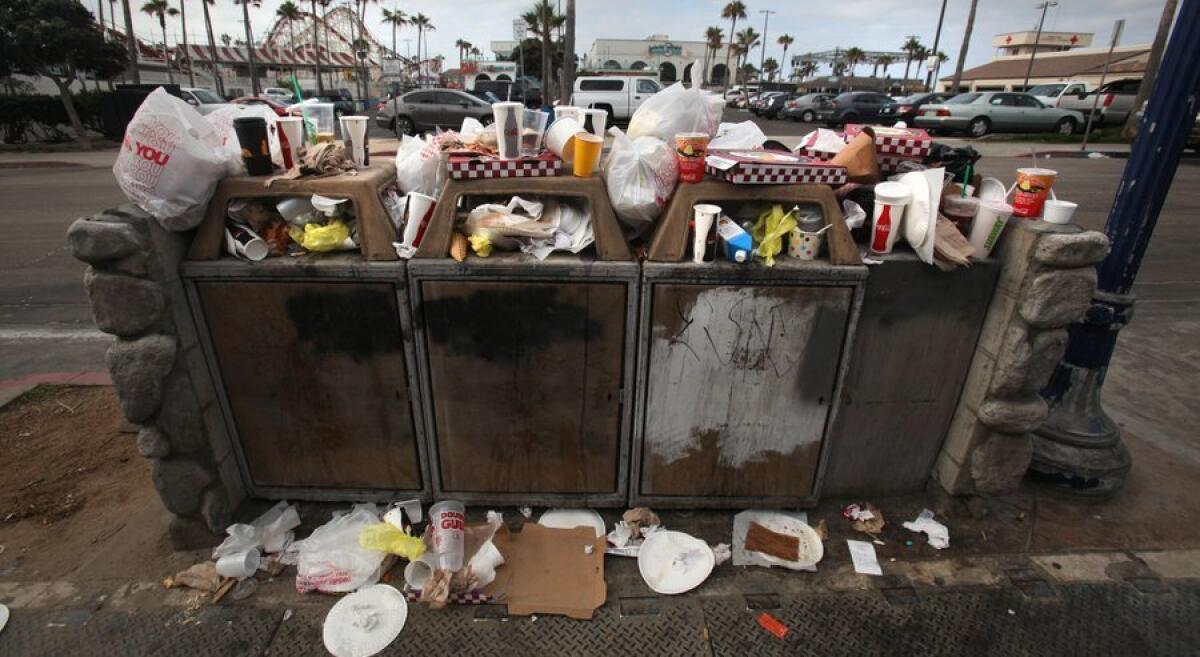Editorial: Don’t despair. California’s fight against plastic trash is far from over

- Share via
The 11th-hour failure of a landmark plastic pollution law in the California Legislature in August was a crushing disappointment. The world is awash in plastic trash and — finally! — a concrete plan to cut off the flow of discarded water bottles and plastic bags was within reach.
The California Circular Economy and Plastic Pollution Reduction Act proposed by Sen. Ben Allen (D-Santa Monica) and Assemblywoman Lorena Gonzalez (D-San Diego) would have significantly reduced single-use plastic waste in California by requiring most packaging to be either compostable or recycled (as in actually getting recycled, not just having the potential) by 2032.
It was a sensible plan that transferred the responsibility for disposed plastic from consumers to plastic makers and distributors. And although the plastic and petroleum industries hated it, the proposal had the widespread support of environmentalists, local governments and even the state’s grocers association.
Nevertheless, the measure failed for a second time in as many years. But don’t despair, California. This is not the end of the state’s fight to curtail disposable plastic. It’s still on.
It has to be, because the promise of easy and widespread recycling of plastic trash has been exposed as a fiction. Less than 10% of all the plastic ever made has been recycled. The rest has been dumped in landfills, burned or let loose in the ocean and on the ground. And yet the petrochemical companies (most plastic is made from fossil fuels) are shamelessly ramping up production of single-use plastic in part to compensate for a decline in demand for gasoline. This can’t be allowed to happen, and California is the best shot the nation has of getting the plastic problem under control.
The good news is that the Legislature didn’t whiff completely when it came to addressing the global scourge of plastic this year. It passed an important if less sweeping bill that requires plastic beverage containers sold in the state to contain an increasing amount of recycled content, starting at 15% in 2022 and rising to 50% in 2030. This requirement will help drive the flagging market for recycled plastic. Right now, the industry has an incentive not to use recycled material because making “virgin” plastic from petrochemicals is cheaper than collecting plastic trash and turning it into something new.
The new mandate will help, but seven decades of plastic pollution calls for a more ambitious approach. Recycling is never going to be able to handle all the plastic currently produced (a fact the industry has known since 1974 at least, as it turns out).
Advocates for a solution to the plastic trash problem now have their hopes pinned to a plastic waste measure likely to be on the 2022 ballot, sponsored by Recology, a waste management company in San Francisco, and supported by environmental groups. While very similar to the bill that failed in August, the initiative goes one step further by placing a penny tax on each plastic container sold in the state. With some 12 billion plastic-bottled beverages sold a year in California alone, that would translate to substantial cash to help cities pay for cleaning up plastic trash and to support the development of new recycling facilities in the state. A poll last year found that 90% Californians believe that plastic trash is a problem for the state’s coast, and it seems likely such a measure will pass.
But Californians don’t have to wait two years to take the fight to the plastic industry. Cities can act now by adopting restrictions on polystyrene food takeout containers, one of the most problematic sources of plastic waste, if they haven’t done so already (we’re looking at you, Los Angeles). They can also enforce existing laws to reduce plastic pollution, such as the ban on single-use plastic grocery bags. The governor temporarily suspended the ban this spring during the COVID-19 pandemic to spare grocery workers from having to handle customers’ reusable bags, but the law is back in place and should be followed.
Also important: Local governments should stop giving cover to the plastic industry as it continues to pollute the world with impunity. That means being straight with residents about how much of the plastic trash they stuff hopefully into curbside recycling bins goes straight to the landfill. That’s what Long Beach city officials have done recently, banning most plastic trash from residential recycling collection. Plastic beverage containers, milk jugs and empty food tubs are still welcome because they are typically made from a type of plastic that is more likely to get recycled (though the majority of that still ends up as trash). Everything else made of plastic is bound for the landfill, no matter which bin it is tossed into.
Meanwhile, Gov. Gavin Newsom should use the excess money the state has collected from the 5- and 10-cent deposits on beverage containers — a surplus of up to $350 million — to help keep private recycling centers open by paying them higher processing fees. It’s a small fix, but there’s no reason to sit on this reserve if it will help keep the small stream of disposable plastic that still has some recycling value out of the landfill while supporting small businesses and local economies suffering from pandemic restrictions.
More to Read
A cure for the common opinion
Get thought-provoking perspectives with our weekly newsletter.
You may occasionally receive promotional content from the Los Angeles Times.










